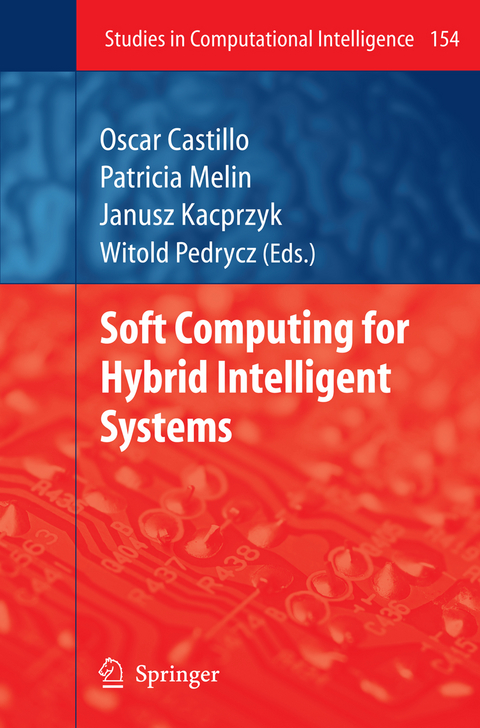
Soft Computing for Hybrid Intelligent Systems
Springer Berlin (Verlag)
978-3-642-08975-6 (ISBN)
We describe in this book, new methods and applications of hybrid intelligent systems using soft computing techniques. Soft Computing (SC) consists of several intelligent computing paradigms, including fuzzy logic, neural networks, and evolutionary al- rithms, which can be used to produce powerful hybrid intelligent systems. The book is organized in five main parts, which contain a group of papers around a similar subject. The first part consists of papers with the main theme of intelligent control, which are basically papers that use hybrid systems to solve particular problems of control. The second part contains papers with the main theme of pattern recognition, which are basically papers using soft computing techniques for achieving pattern recognition in different applications. The third part contains papers with the themes of intelligent agents and social systems, which are papers that apply the ideas of agents and social behavior to solve real-world problems. The fourth part contains papers that deal with the hardware implementation of intelligent systems for solving particular problems. The fifth part contains papers that deal with modeling, simulation and optimization for real-world applications.
Intelligent Control.- Optimization of Interval Type-2 Fuzzy Logic Controllers for a Perturbed Autonomous Wheeled Mobile Robot Using Genetic Algorithms.- Fuzzy Control for Output Regulation of a Servomechanism with Backlash.- Stability on Type-1 and Type-2 Fuzzy Logic Systems.- Comparative Study of Type-1 and Type-2 Fuzzy Systems Optimized by Hierarchical Genetic Algorithms.- Comparison between Ant Colony and Genetic Algorithms for Fuzzy System Optimization.- Pattern Recognition.- Type-1 and Type-2 Fuzzy Inference Systems as Integration Methods in Modular Neural Networks for Multimodal Biometry and Its Optimization with Genetic Algorithms.- Interval Type-2 Fuzzy Logic for Module Relevance Estimation in Sugeno Integration of Modular Neural Networks.- Optimization of Response Integration with Fuzzy Logic in Ensemble Neural Networks Using Genetic Algorithms.- Optimization of Modular Neural Network, Using Genetic Algorithms: The Case of Face and Voice Recognition.- A New Biometric Recognition Technique Based on Hand Geometry and Voice Using Neural Networks and Fuzzy Logic.- Intelligent Agents and Social Systems.- A Hybrid Model Based on a Cellular Automata and Fuzzy Logic to Simulate the Population Dynamics.- Soft Margin Training for Associative Memories: Application to Fault Diagnosis in Fossil Electric Power Plants.- Social Systems Simulation Person Modeling as Systemic Constructivist Approach.- Modeling and Simulation by Petri Networks of a Fault Tolerant Agent Node.- Fuzzy Agents.- Hardware Implementations.- Design and Simulation of the Fuzzification Stage through the Xilinx System Generator.- High Performance Parallel Programming of a GA Using Multi-core Technology.- Scalability Potential of Multi-core Architecture in a Neuro-Fuzzy System.- Methodology to Test and Validate a VHDL Inference Engine through the Xilinx System Generator.- Modeling and Simulation of the Defuzzification Stage Using Xilinx System Generator and Simulink.- Modeling, Simulation and Optimization.- A New Evolutionary Method Combining Particle Swarm Optimization and Genetic Algorithms Using Fuzzy Logic.- A Hybrid Learning Algorithm for Interval Type-2 Fuzzy Neural Networks: The Case of Time Series Prediction.- Optimization of Artificial Neural Network Architectures for Time Series Prediction Using Parallel Genetic Algorithms.- Optimized Algorithm of Discovering Functional Dependencies with Degrees of Satisfaction Based on Attribute Pre-scanning Operation.- A Fuzzy Symbolic Representation for Intelligent Reservoir Well Logs Interpretation.- How to Solve a System of Linear Equations with Fuzzy Numbers.- Design and Implementation of a Hybrid Fuzzy Controller Using VHDL.
| Erscheint lt. Verlag | 28.10.2010 |
|---|---|
| Reihe/Serie | Studies in Computational Intelligence |
| Zusatzinfo | XII, 448 p. 385 illus. |
| Verlagsort | Berlin |
| Sprache | englisch |
| Maße | 155 x 235 mm |
| Gewicht | 687 g |
| Themenwelt | Informatik ► Theorie / Studium ► Künstliche Intelligenz / Robotik |
| Informatik ► Weitere Themen ► CAD-Programme | |
| Mathematik / Informatik ► Mathematik ► Angewandte Mathematik | |
| Technik | |
| Schlagworte | Agents • Cognition • Computational Intelligence • Hybridd Intelligent Systems • Intelligent Systems • Modeling • Optimization • pattern recognition • Simulation • Soft Computing |
| ISBN-10 | 3-642-08975-5 / 3642089755 |
| ISBN-13 | 978-3-642-08975-6 / 9783642089756 |
| Zustand | Neuware |
| Haben Sie eine Frage zum Produkt? |
aus dem Bereich


